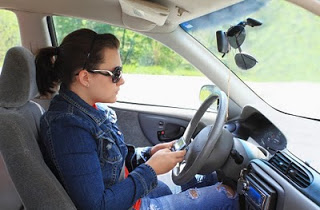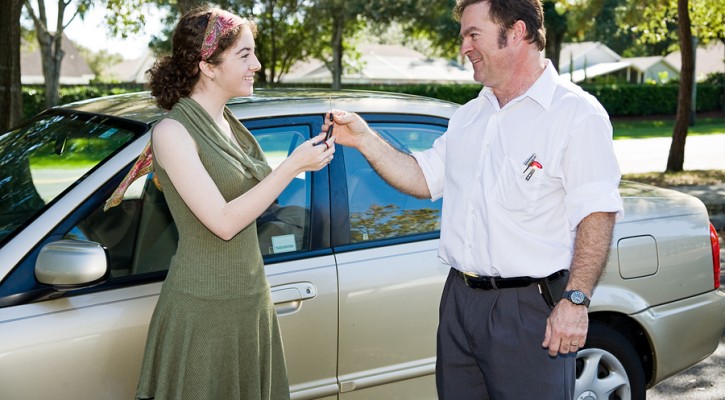Category Archive: Parents

Teens: Celebrate Your Graduation Safely
May 14, 2010
Graduation is finally here! Let me guess, you suddenly feel older, more mature, and ready for anything? You are on your way into the work force or heading off to college. Either way, freedom is within reach and it is time to celebrate! There are so many parties, dinners, and other events, all in you and your peers’ honor. Temptation will surround you. Peer pressure will be high, and the euphoria of the event will be a different pressure. You may think something like, “if I have one drink, it is not a big deal, I deserve to celebrate.” You may hear, “just have one drink, it won’t hurt you.” Before you give into the temptation, know the facts. It could save your life, a friend’s life, or a stranger’s life.
Did you know?
- 40, 000 people die every year in motor vehicle accidents
- 16,000 of those deaths are alcohol or drug related
- Graduation night is one night where impaired driving is most likely
- There is a zero tolerance law for impaired driving under the age of 20
What are possible consequences of impaired driving?
- Death of you, a friend, or stranger
- Serious injury of you, a friend, or stranger
- Loss of scholarships
- Incarceration
- Suspension or Revocation of your driver’s license
- Fines
Think about this before you drink/drug drive. You have a best friend that you have known since you were eight years old. You both are excited about the after graduation party. You drive you and your best friend to the party. You both decide to have a few drinks and you even take a hit off the joint being passed around. After all, it is your night and you have the right to celebrate. That is the last thing you remember and now you are waking up in the hospital. You are seriously injured, but far worse, you find out that your best friend was killed in a car accident on the way home from the party, and you are responsible. Situations like this have happened before and it CAN happen to you? Do you want to wake up in the hospital with serious injuries and someone telling you that you are responsible for the death of your best friend? I doubt it.
What can you do to keep yourself and others safe?
- Don’t drink or take drugs
- If you are impaired, call for a ride (taxi, sober friend or family member, ect.)
- Have a designated driver
- Do not get in a car with anyone who is impaired
- Sleep over
We can’t predict what others may do. So if you are riding with friends, have a plan if they become impaired. Know who you can call, be willing to ask for the keys, and if possible find out if they plan on drinking before going to the party with them. You may need to make alternate arrangements to get to the party.
It is an exciting time and you should celebrate your success. Your success can end in a matter of seconds with one bad decision. True freedom comes with smart decisions. Celebrate your entry into your adult life by making good decisions on your graduation night. Stay safe by staying sober.

Taking Your Restricted Drivers License Across State Lines
May 11, 2010
Restricted license sure is a step-up from a learner’s permit, but it’s still not the unrestricted, seemingly-special license and for good reason. The graduated driving license (GDL) laws are designed to introduce teen drivers gradually into the driving environment by limiting distractions such as other teen passengers and cell phone use. The laws also restrict driving at night until the teen has gained a lot of driving experience. The GDL laws in your state may allow you to drive alone under certain circumstances but that law may not apply in other states.
No one under 18 – Most states only consider drivers eligible for application of the unrestricted license if they are over the age of 18. However other states, such as New York, prohibit unrestricted driving by anyone under the age of 21, even if they hold an unrestricted license in another state.
Each state’s DMV honors restriction put about by your state – If you receive a ticket in another state, your home state will be notified and your driving record will show the traffic offense just as if had been committed in your home state. Whatever points your home state applies to a particular offense will be added to your driving record. If you are caught violating the restricted driving rules of your state, you could be charged with driving without a valid license.
Double Trouble – If you commit a traffic offense in another state, you will have to pay the fines for that state and you will find that you will have points assessed in your own state. If the offense committed in another state puts you over the point limit in your home state, you could find that your license has been suspended. If your license is suspended in one state, all other states will honor that suspension.
Holding a driver’s license, even a restricted one means being responsible and following restrictions put about by the driver’s state. If you plan to travel to another state, you can go to that state’s DMV web site and find out if your privilege to drive in that state will be more or less restricted. It is better to do the homework first rather than finding out too late by receiving a traffic ticket.
For more information about driving laws visit your state see our DMV Department of Motor Vehicles Directory.

Measures Taken to Stop Distracted Driving
May 5, 2010
Each day, as it seems, more and more information about the dangers of distracted driving comes out — which increases the awareness of drivers about the growing problem. But what has been done? What exactly are organizations and individuals doing to combat distracted driving?
Forming Organizations
When you Google “distracted driving groups” it will yield several results — of individuals banding together, increasing awareness on distracted driving, on a local or country-wide basis. These can be as simple as asking people to pledge against distracted driving, like Oprah’s No Phone Zone, or wearing thumb socks to show a driver’s support for not texting while driving. These groups establish their presence online, in various social networking services, making it easier for their targets to get the message.
Enacting Laws
With the nationwide awareness on the shocking statistics of texting while driving, local governments have acted to put in motion laws that would prohibit cell phone usage while on the road. So far, more than 30 states have a law that places a ban on texting while behind the wheel, urging drivers to think twice before they pull out their phones, unless they want a penalty. For now, the options are being weighed on how to effectively enforce texting ban laws — but public support usually wins, and a law is enacted.
Phone/Text-blocker apps
Stopping phone use while on the road? Simple. Install a phone/text-blocker app. These applications interface the phone to the car’s GPS and if it sees that the car is in motion, the app disables the phone’s features. With crash-risk increasing 4 times/talking on the phone and 23 times/texting — it may help discipline the driver into not relying on their phones so much while on the road, until hopefully, they won’t have a need for such an application anymore. Learn more about apps like this including http://www.Textecution.com/.
Mock Crashes
Several local/teen driving advocacy groups have set up mock crashes to remind teen drivers (the group who are most likely to engage in texting while driving) what could potentially happen if they text and drive at the same time. In most places, the mock crashes are set up in a way that, the first things that teens going to school are going to see are wrecked cars, teen-drivers-playing-dead-with-phone-in-hand and lots of fake blood. It is a shocking, yet accurate statement that would inform teen drivers of the potential consequences.
Trial Runs
There are also trial runs — usually hosted by a state’s DMV along with several advocates against distracted driving — they allow drivers to experience firsthand what could happen should they attempt to text while driving. Set in an enclosed space, with only traffic cones as obstacles, there are only a few who manage to get through the course without hitting any of the cones while texting/driving. There are drivers who believe they are perfectly capable of handling both tasks, but running through a trial distracted driving course more or less proves them otherwise.
Ads
Various organizations would release ads that are either funny or serious in order to make their point. Some organizations do their advertisements a step above by involving the people themselves — they create contests asking drivers if they have what it takes to get the message across, in video form. Which is a good thing — it awakens an enthusiasm and awareness in teen drivers — which makes them think about safety when driving.
Distracted Driving Courses
The addition of cell phones, texting and driving, in-vehicle video entertainment, and navigation systems lengthens the long list of driver distractions. Research reveals that many new drivers do not recognize the risk of these activities when driving. To make teen drivers more aware of the risks there are courses like Dangers of Distracted Driving. The course creates a clear understanding of the distractions while driving and how they can cause crashes and cost lives.

Parents are the Key to Teen Driving Safety
April 6, 2010
Imagine your 16-year old, late after his first solo drive — the phone rings and it’s your child, asking you to pick him up. He lets you know that he had an accident. You feel relief that everyone is safe, you bring both the vehicle and your child home. As you begin to understand what happened, you think how could I have prepared my child for this situation.
Having a conversation about how to handle a vehicle emergency is the right start. For many new drivers, more behind the wheel experience in a variety of driving scenarios including adverse weather conditions or driving on the highway can greatly improve their driving skills. In addition making sure that the car is properly maintained should also be a priority.
For many new drivers, parents are the key to teen driving safety.
The first few years are the most dangerous for the new driver. Statistics don’t lie — for nearly a decade, (1995 – 2004) more than 30% of all crashes involved teen drivers. Leading to the creation of the Graduated Driver’s License law, making parents more important in the lives of their teen drivers. These laws allow for a new driver to prove their maturity and trustworthiness.
Depending on what state you live in, your teen driver might need more in-car experience. As mentioned above, various states have a form of the GDL law, requiring up to 50 hours of supervised driving, including 10 hours of night-time driving. To help track and log your teens driving hours you can use a Teen Driving Experience Log Book to track the maneuvers practiced, the weather conditions or even the route.
There is bond that helps children understand a lesson better, if taught by his parents. Please keep this in mind as your child prepares for the responsibility of driving. Remember, parents are the first teachers for most experiences in their teens life.
For additional information on Graduated Drivers License Laws read:
Four Ways Teens Benefit from Following Graduated Drivers License Laws
Teaching Your Teen To Drive During the Christmas Holiday Season
December 14, 2009
The Christmas season is supposed to bring out the best in us but, for drivers, it seems to bring out the worse. The mad rush to commute from work, get to the mall, and complete our shopping in a reasonable amount of time, makes this season one of the most dangerous driving periods of the year. With the arrival of the Christmas shopping season, parents, whose children are learning to drive on a learner’s permit, may be reluctant to let their teen drive in such a crazy driving environment.
Only you can decide whether or not your teen may be prepared to drive during this season. For a teen who only has a month or so of driving experience, it is probably not a good idea to allow them to drive in heavy Christmas traffic. However, for a teen with a good deal of driving experience, it is probably the best time to allow them to drive while you are in the seat next to them to give them guidance. This season presents a great teaching experience and an opportunity to open up a dialogue about how not to drive.
Before you and your teen venture out to the mall, you would be wise to discuss the driving environment and let the teen know what he or she can expect. You will need to exercise a great deal of patience, both with each other and with the other drivers on the road.
What kind of driving experiences and teaching moments can you and your teen expect?
Other Drivers
This season brings out the worst in drivers. If a driver cuts you off, tries to steal your parking space, or is honking the horn when you can’t move, don’t give into the urge to retaliate by gestures, honking your horn, or flashing your lights. You may wind up pushing an irate driver over the edge into a road rage situation where the other driver may try to attack you in some way. Both you and your teen should keep your cool, pay attention to your own safety and get out of the way of an irate driver as quickly as you can.
Remember that you can’t take the right-of-way, you can only give it up to someone else. If there is a conflict with another driver trying to take the right-of-way, it is much safer to give it to them.
Intersections
Several problems will be encountered at intersections. First, and most dangerous, will be those impatient drivers who will step on the gas in hopes of beating a red light. Many drivers will deliberately run the red light. Once your light turns green, don’t be in a hurry to go. Have your teen look in all directions to make sure that no one is trying to run the red light before proceeding.
The other issue you will have to contend with are those drivers who pull forward into intersections when traffic ahead is stopped and wind up blocking the intersection when the light changes. Your teen will need to stop at the stop line before the intersection and wait until traffic ahead has cleared enough to allow her to proceed completely through the intersection.
Pedestrians
There is probably no time of year where we encounter more pedestrians on the road. Remember that pedestrians in a crosswalk, whether marked or not, always have the right-of-way. Pedestrians can’t move as fast as a car can, especially when they are burdened down with packages, so don’t expect them to jump out of your way. Remember also that pedestrians may not hear you coming. Their minds are occupied just like yours. Their ears may be wrapped in a muffler or a hat or the pedestrian could be totally deaf.
Be careful and have a safe and enjoyable holiday season.
Additional Driver Safety Tips for the Holiday Seasons:
http://alerts.nationalsafetycommission.com/2009/10/holiday-driving-halloween-safety-tips.php
http://alerts.nationalsafetycommission.com/2009/11/thanksgiving-traffic-safety-2009.php
